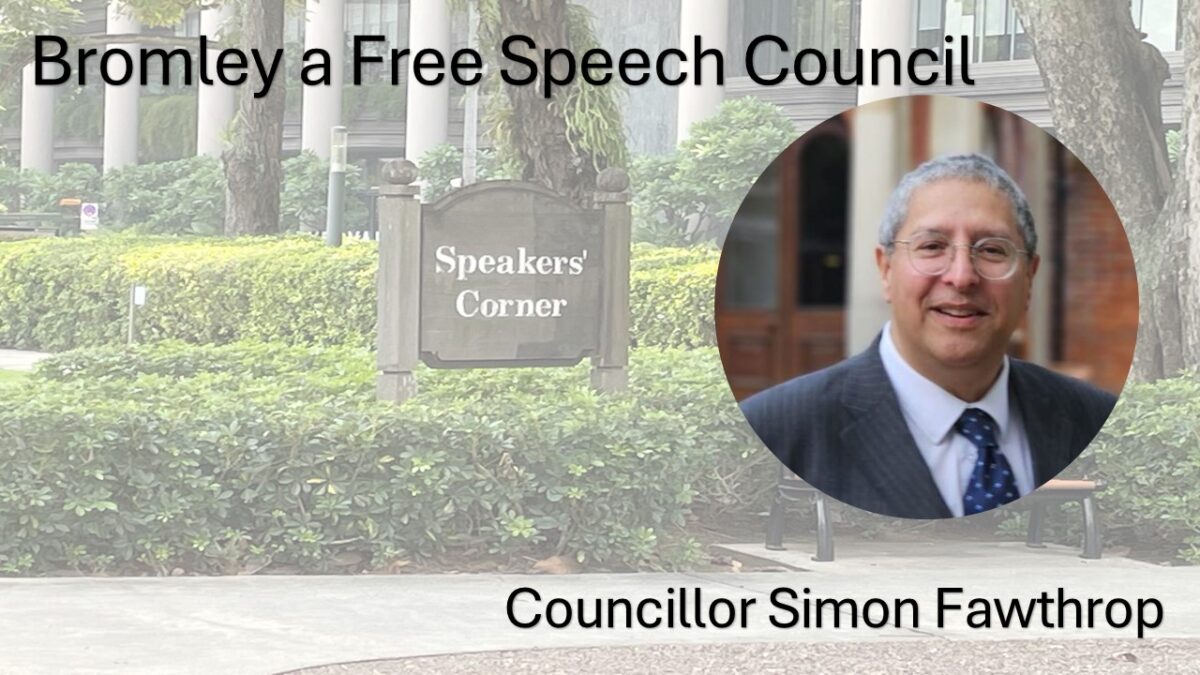Bromley Council has recently passed a policy to enshrine free speech in its procedures, code of conduct and constitution. We spoke with the Chairman of the Executive, Resources and Contracts Committee at Bromley Council, Councillor Simon Fawthrop.
“We have seen multiple court cases where employees have been unduly penalised, or Council’s have supressed free speech”
Could you briefly introduce Bromley Council and the borough to our readers?
Bromley Council is the largest borough in Greater London, a mainly suburban borough in the south and east around Chislehurst, Orpington and Biggin Hill and more urban in the North towards Crystal Palace. The Borough has the longest road network in greater London and is about 50% greenbelt land. It is run by the Conservatives and currently solvent!
“Roy Chubby Brown isn’t to everyone’s tastes, for instance, but did the residents of Lancaster really need their council to save them from smutty humour”
Why did Bromley decided to become a Free Speech Council?
Essentially for two reasons, the initial reason was to protect employees from being persecuted for speaking freely, to allow them to whistle-blow without repercussions. We have seen multiple court cases where employees have been unduly penalised, or Council’s have supressed free speech, examples highlighted by the Free Speech Union (FSU) groan with examples of short-sighted intolerance and outright legal error.
Blue comedian Roy Chubby Brown isn’t to everyone’s tastes, for instance, but did the residents of Lancaster really need their council to save them from smutty humour by cancelling his show?
What of Basingstoke and Deane, which investigated an elected councillor under its code of conduct for use of the term ‘year zero’? (It’s allegedly offensive to the victims of Pol Pot, in case you were wondering.)
Was it really wise of Sandwell Metropolitan Borough Council to support its employee’s injunction against citizen journalist Julian Saunders, only for a High Court judge to throw the case out with a reminder that, in this part of the world, journalists are free to speak and write?
And think again about visiting the Yorkshire town of Calderdale if you’re a broad reader – its library squirreled away books by gender-critical authors in a bid to suppress the fashionable heresy that men are men, and women are women.
“it will ultimately allow us to challenge other organisation to have the same high stands that we have when it comes to free speech”
The second reason is that political speech is under increasing pressure to only follow orthodox lines. Original and critical thinking, left field views and challenge are often frowned upon and subject to peer pressure to conform to the orthodoxy. The changes we have and are making, give additional protection to Councillors, recognising that we are representatives of our electorate and that codes of conduct in an HR style put unwarranted constraints on free speech. Why would residents elect someone who is not able to speak up for them? These changes reaffirm those extra freedoms and protect elected representatives, but it goes further, it will ultimately allow us to challenge other organisation to have the same high stands that we have when it comes to free speech.
“allowing employees to whistle-blow and speak freely is important to good governance”
Aren’t councils about potholes, bins, schools, and social services. What makes this something for the council to get involved in?
Yes, Councils are about all of those things and more, but Councils can be innovative and set a good example. Having a policy on licensing or planning or how a Council looks after their employees doesn’t prevent them doing all those other things. More importantly having a policy helps them do those things, allowing employees to whistle-blow and speak freely is important to good governance.
If other authorities want to become Free Speech Councils, where do they start?
If they want, they can contact me and I can give them the Bromley policy to copy, alternatively they can contact the Free Speech Union (FSU) and see if they can be of any assistance. The FSU were tremendous help to Bromley Council in progressing this policy and we couldn’t have done it without their help and guidance. For assistance below are links to copies of our policy and my comments when I introduced the policy at committee.

